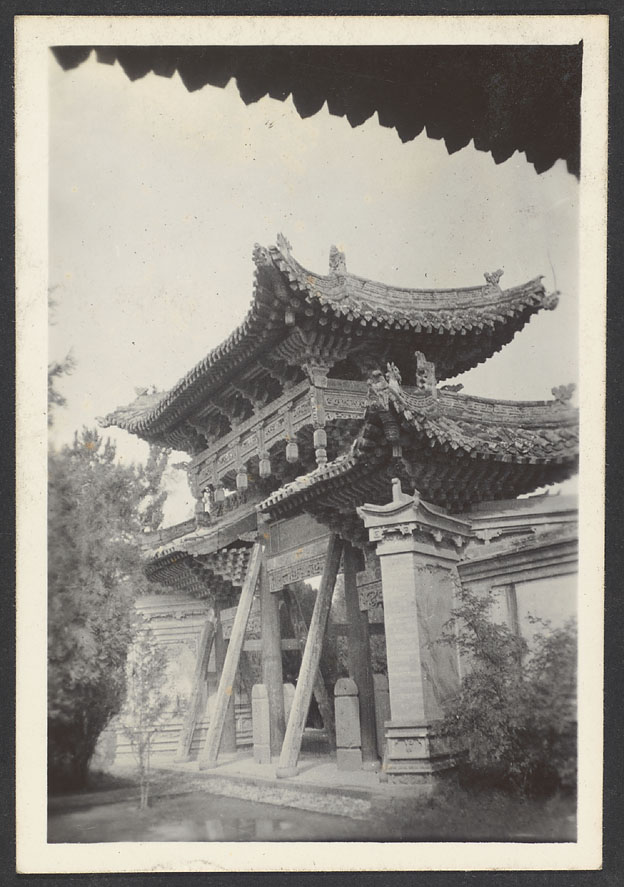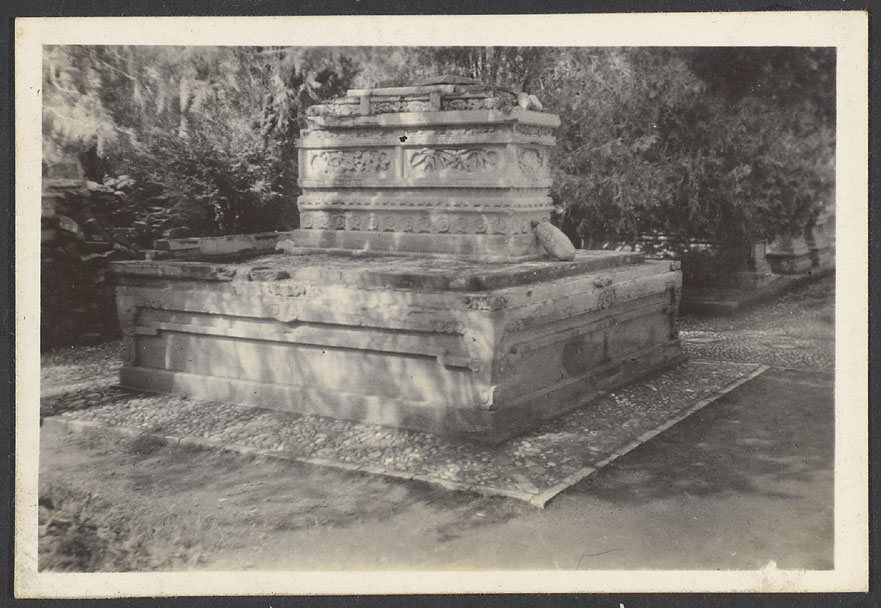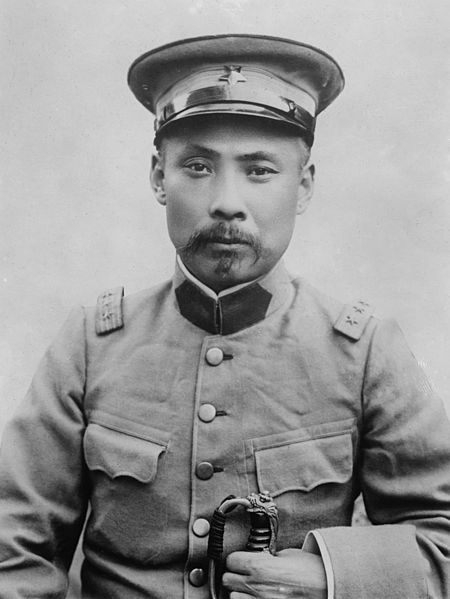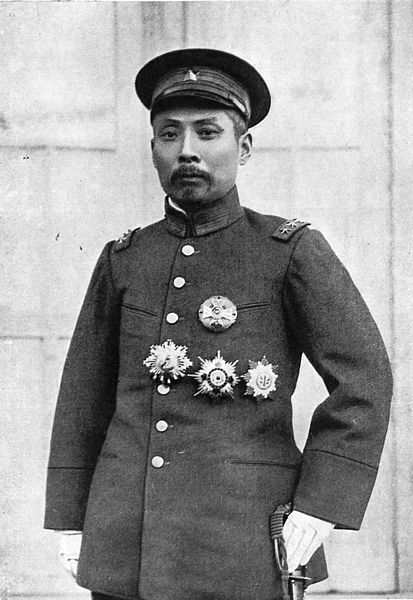<Back to Index>
- General of Xinjiang Ma Anliang, 1855
- Commander of the Beiyang Army and Premier of the Republic of China Duan Qirui, 1865
PAGE SPONSOR


Ma Anliang (1855 – November 24, 1919) (simplified Chinese: 马安良; traditional Chinese: 馬安良), a Hui, was born in 1855, in Linxia, Gansu, China. He became a general in the Qing dynasty army, and of the Republic of China. His father was Ma Zhanao, and his younger brother was Ma Guoliang. Ma was educated in Chinese and Islamic education.
He defected to Qing in 1872 during the Dungan revolt, along with several other Hui Muslims, including his father, Ma Zhanao, Ma Haiyan, and Ma Qianling. They belonged to the Huasi menhuan, of the Khafiya Naqshbandi Sufi order. They assisted the Qing Han Chinese general Zuo Zongtang in suppressing the Muslim revolt. In 1877, his father Ma Zhanao defeated a group of Muslim rebels who continued fighting near Hezhou.
General Ma Anliang joined the Qing General Zuo Zongtang, in the campaign against the Turkic Muslim rebels under Yaqub Beg. Ma Anliang led an entire army composed of Chinese Muslim troops against Yaqub Beg's Turkic Muslim forces, and defeated him, reconquering Turkestan for China.
In 1895, he served with the Han Chinese general Tang Yanhe and the Muslim general Dong Fuxiang, assisting them in crushing another Muslim revolt. His Muslim cavalry defeated Muslim rebels at Oxheart Mountain, and relieved the siege of Hezhou on December 4. He led hui cavalry troops to massacre Salar fighters who had agreed to negotiate at a banquet, and was promoted to General of Xinjiang, and Colonel of Hezhou for his service, once the revolt was crushed. The revolt was led by Ma Yonglin, Ma Wanfu, and Ma Dahan. Ma Dahan was publicly executed. It was said that Ma Anliang's red cap was dyed with Muslim blood.
During that war, in 1895 he lifted the siege of Xining (sining) with four ying (ying is a Chinese unit for battalion). Ma was assigned to "Barkul military command" sometime before 1910.
In 1900, during the Boxer Rebellion, Ma Anliang, as Tongling of Ho-Chou joined Dong Fuxiang in fighting against the foreigners.
In 1905, Ma Anliang, in cooperation with the Han Chinese magistrate Yang Zengxin, attempted to arrest and execute the Yihewani (Ikhwan in Arabic) leader Ma Wanfu. Ma Qi, one of Ma Anliang's subordinates, staged a rescue operation and brought Ma Wanfu to Xining.
Even though he was a Muslim, he and his Muslim troops showed no mercy to Muslims who rebelled against the Qing government, and massacred them.
In 1911, when the Xinhai Revolution erupted, he led over 20 battalions of Hui Muslim troops to defend the Qing dynasty by attacking Shaanxi, which was held by the revolutionaries under Zhang Fenghui. He defeated the revolutionaries in combat, but then when the Qing emperor Puyi abdicated, Ma agreed to join the new Republic of China government under the Kuomintang.
In October 1903, in Ili, Ma Anliang served as "Brigade - General". In April 1912 he became "Commader - in - Chief" of Gansu.
Ma Anliang fought against the bandit Bai Lang, and attacked the Xidaotang (西道堂) Muslim organization. He was suspicious of the Republicanism of the Xidaotang, since Ma was a conservative and a monarchist and supported Yuan Shikai. Ma arranged for the Xidaotang founder Ma Qixi and his family to be shot to death. Han and Hui soldiers under the Hui generals Ma Anliang and Ma Qi united to fight against Bai Lang's bandit army.
In 1914, Ma Anliang tried to exterminate the "New New Sect", the Xidaotang and its leader Ma Qixi (his Arabic name was Ersa (Jesus), he was known as "Prophet Jesus" to westerners).
General Ma Anliang was the de facto senior leader of all Muslims in northwestern China from the beginning of the Republican era in 1912 until he died. He was succeeding by General Ma Fuxiang in this position.
Ma Anliang was considered "reactionary", while the learned "scholar" General Ma Fuxiang was considered "progressive".
He died in Hezhou (Hochow), on November 24, 1919.
His father was Ma Zhanao and his brother was Ma Guoliang He had 5 sons, Ma Tingran, Ma Tingxian, and 3 other unknown children. Ma Tingxian was executed in 1962 by the Peoples Court. Yuan Shikai made Ma Anliang a Baron of the First Rank (一等男 Yī děng nán) of the Empire of China (1915 – 1916).


Duan Qirui (Chinese: 段祺瑞) (6 March 1865; November 2, 1936) was a Chinese warlord and politician, commander in the Beiyang Army, and the Provisional Chief Executive of Republic of China (in Beijing) from November 24, 1924 to April 20, 1926. He was arguably the most powerful man in China from 1916 to 1920.
Born in Hefei as Duan Qirui (段啟瑞), his courtesy name was Zhiquan (芝泉). His grandfather was Duan Pei (段佩), an officer in Li Hongzhang's privately raised Huai Army (Huai Jun, 淮军). Duan Qirui's father died early and Duan Qirui was raised by his maternal grandmother.
In 1881, Duan Qirui entered Baoding Military Academy specializing in artillery, and graduated at the top of his class. After graduation, he was sent to Lushun to oversee the construction of artillery fortifications and came to the attention of Li Hongzhang, who sent him to study military science in Germany for two years. After returning to China, he was first named as a commissioner to the Beiyang Armory (北洋军械局) and then as an instructor at Weihai military academy. Soon he was able to gain the sponsorship of Yuan Shikai, who named him as an artillery commander in the New Army.
Duan first saw action in the Boxer Rebellion, where he served Yuan in Shandong province and distinguished himself in combat against the Boxers. Yuan then gave him command over a Beiyang army division in 1904. In 1906 he was appointed as the director of the Baoding Staff College, which allowed him to begin recruiting his own clique of loyal junior officers.
During the Xinhai Revolution that toppled the Qing Dynasty, Duan's corps was successful against the revolutionary army and recovered Wuhan. Duan commanded the Second Army Corps in Hubei and supported Yuan Shikai. For his loyalty, Yuan appointed him military governor of both Hunan and Hubei provinces. He was further named to Yuan's cabinet as minister of war in 1912, and then premier in 1913. Because he had publicly supported the Emperor's abdication while serving as an envoy of the central government in 1911, Duan's promotions were supported by the Kuomintang.
Duan
rose to power as a close ally of Yuan Shikai, but later opposed Yuan's
attempt to declare himself Emperor. Duan was expecting to eventually
succeed Yuan in the presidency, and Yuan's imperial gambit was seen by
Duan as a betrayal. After several provinces declared independence from
Yuan's government, Duan tried to play the intermediary between the rebels and Yuan, just as Yuan had done during the Xinhai Revolution. Their friendship never recovered, even after Duan was given the premiership,
partially because Yuan had shrewdly stripped that office of its powers.
Duan served as premier intermittently from 1913 to 1918, under several
governments, as part of a series of shaky coalitions which often
collapsed. Yuan's attempt to establish his own dynasty had destroyed the
unity of China, and many provinces had achieved de facto independence from Beijing as early as 1915.
In 1916, when Yuan Shikai was on his deathbed he called several of the most important political and military figures in his government, including Duan, to hear his last political testament. Yuan was only able to say two words: "the Constitution", which no one was able to interpret. Yuan's 1914 constitution stipulated that, in the event of the impending death of China's president, the president would place the names of three men to potentially succeed him after his death. After his death, the box would be opened and one of the men named would be elected.
Yuan died on June 6 1916. When the box was opened, Duan Qirui, Li Yuanhong, and Xu Shichang were named. None of the three men initially wanted to take the presidency. Duan consulted with the other senior military leaders of northern China, calculated that Li was the weakest and least popular of the three men, and then successfully pressured Li to take the presidency, possibly under the rationale that a weak, unpopular president would be easier to manipulate. Duan served under Li as premier, but dominated Li and the rest of the government, and ruled for a time as the effective dictator of northern China, challenged mostly be semi - independent warlords. Neither Duan nor Li ever attempted to submit Li's appointment as president to a parliamentary or general election, indicating a general contempt that Duan held for constitutional reform.
Duan Qirui, in his appointment as Premier, refused to recognize the old 1912 constitution. He was opposed by both President Li Yuanhong, who had assumed the presidency on Yuan Shikai's death, and Vice - President Feng Guozhang, the second most important Beiyang military commander after Duan himself. On June 15 1917, the admiral of the Chinese First Fleet, Li Tingxin,
along with China's most senior naval commanders, issued a statement
supporting the 1912 constitution and threatened to ignore orders from
Beijing if it was not restored, and declared their solidarity of the
"National Protection Army" in the southwest, which also claimed to
support the constitution. Eventually,
Feng was able to persuade Duan to relent and the dissident government
in the south agreed to dissolve itself when Parliament was reconvened.
Nevertheless, the parliament and the country remained as divided as ever
between north and south. Duan and the other Beiyang leaders refused to
be dictated to by southern parliamentarians, composed mostly of Sun Yat-sen's Guangdong based Kuomintang party, backed by southern armies outside Beiyang control. Duan decided to take
action against southern military commanders by reassigning them to
other posts and thereby breaking their control. In order to do this, he
decided to attempt to oust the pro - Kuomintang military commander of
Hunan; however, the cabinet refused to do so. In spite of this, Duan's right
hand man and Cabinet Secretary, Xu Shuzheng, issued orders on his own initiative to launch an attack on Hunan.
In Europe, World War I had reached a crucial point by 1916 - 17. Duan saw an opportunity to ingratiate China to the European powers and the United States by declaring on the side of the Allies against Germany. By entering the war, Duan hoped for some quid pro quo from her new allies such as the cancellation of many of the indemnities and concessions that China had been forced to sign in the past. He also hoped China could gain international prestige by involving itself in the great war. However, Duan was opposed again by both the president and vice - president along with most of the parliament. Duan was impatient to gain parliaments approval through negotiation and resorted to bullying tactics with organized mobs. In response president Li Yuanhong dismissed Duan as premier after parliament had voted for his resignation.
At this juncture, a monarchist general, Zhang Xun, marched his army into Beijing and announced the restoration of the Qing dynasty on July 1 1917. Outraged, the other Beiyang generals led by vice - president Feng Guozhang mobilized their forces and ended the short lived restoration attempt. Duan was returned to power while Li Yuanhong, having had enough of Beiyang politics, resigned the presidency. A few days later China entered the First World War on the side of the Allies.
Duan's
strategy now was to negotiate financial loans with Japan, in exchange
for concessions, to fund a military buildup for the conquest of the
south. The political cover for this army was the entry of China into the
First World War. With
the poor state of the government's credit and European wartime expenses
making both Western and domestic financing impossible, he secretly
negotiated the first of the Nishihara Loans with Japan on September 29, 1917. In exchange, he offered Japan the right to station troops in Shandong province, then a German concession, as well as the right to build and run two new Shandong railroads. There would be a high political price to
pay when these negotiations came to light later on, but in the meantime
Duan got the money for his army. This later became part of the reason
for the Shandong Problem.
After Feng Guozhang had restored him as premier, Duan Qirui quickly began preparations to mobilize troops for conquest of the south. The south responded by forming another rival government against the north and organizing the Constitutional Protection Movement. Duan dispatched two former subordinates of Feng Guozhang to the south to conquer Hunan, the linchpin of central China; one of these commanders was Wu Peifu. Wu supported Feng's preference for peaceful reconciliation with the south and refused to fight. Embarrassed by this fiasco in the south, Duan was forced to resign as premier in November 1917.
Nevertheless, Duan still exercised enormous influence in Beijing due to the various military commanders that were still loyal to him. Feng Guozhang was forced to reappoint him to cabinet as Minister of War, and once again Duan dispatched troops to the south. He also ordered Zhang Zuolin, military ruler of Manchuria, to send troops to Beijing as a ploy to further pressure Feng to restore him to the premiership. However, Wu Peifu once again refused to follow his orders to invade the southern provinces. Faced with the threat from Feng Guozhang, Cao Kun, and Wu Peifu's coalescing "Zhili clique," Duan attempted to strengthen his position by forming his own political party called the "Anhui Clique." He also used the funds from the Nishihara Loans to build up his military forces, employing Japanese officers to train his troops.
President Feng Guozhang's term expired on October 10, 1918; in an attempt to placate the south, he agreed not to seek re-election provided Duan also vacate the office of premier on the same day. Duan's position was also weakening as rumors of his secret dealings with the Japanese began to surface. When the Nishihara Loans were exposed, along with the secret treaty between the Allies and Japan to transfer Shandong to the Japanese, at the Versailles peace conference, Beijing and the rest of the nation exploded in protest in what came to be known as the "May Fourth Movement" on May 4, 1919. Duan's rivals Cao Kun and Wu Peifu of the Zhili clique moved to corner him by organizing an alliance of military leaders, including Zhang Zuolin, who opposed Duan. They also engineered the dismissal of Duan's key subordinate Xu Shuzheng on July 4, 1919. In retribution, Duan forced the new president to dismiss both Cao and Wu even though there was no possible way to actually remove them from their posts. He also renamed his army the "National Pacification Army" and mobilized them for war with the Zhili clique and its supporters.
The conflict came to be known as the Zhili - Anhui War and
lasted from July 14 to July 18 1920. Although Duan's army had been
equipped and trained by Japan, it succumbed easily to Wu Peifu led Zhili
forces and their allies. His
military power shattered, Duan fled to a Japanese settlement in Tianjin
and became an apartment landlord. The Anhui clique began to lose its
coherency as some of its members became affiliated with either the Zhili
clique or Zhang Zuolin's Fengtian faction. Only Zhejiang remained in
the hands of the Anhui clique, although it eventually fell in 1924.
Shandong was allowed by the Zhili clique to later be taken over by an
Anhui warlord under strict conditions of neutrality. Nevertheless, some
Anfu clique politicians remained active in government as the Zhili
clique and the Fengtian faction began to maneuver against each other. Jin Yunpeng,
who had been a protege of Duan, was appointed as premier in August
1920. Other Anhui members secretly mediated between Zhang Zuolin and Feng Yuxiang, an important leader in the Zhili clique, when the latter decided to revolt against his former allies in the Second Zhili - Fengtian War.
Feng Yuxiang's defection resulted in the defeat of Wu Peifu and the Zhili clique and forced them to withdraw to the south. The victorious Zhang Zuolin unpredictably named Duan Qirui as the new Chief Executive of the nation on November 24, 1924. Duan's new government was grudgingly accepted by the Zhili clique because, without an army of his own, Duan was now considered a neutral choice. In addition, instead of "President" Duan was now called the "Chief Executive," implying that the position was temporary and therefore politically weak. Duan called on Sun Yat-sen and the Kuomintang in the south to restart negotiations towards reunification. Sun demanded that the "unequal treaties" with foreign powers be repudiated and that a new national assembly be assembled. Bowing to public pressure, Duan promised a new national assembly in three months; however he could not unilaterally discard the "unequal treaties," since the foreign powers had made official recognition of Duan's regime contingent upon respecting these very treaties. Sun died on March 12, 1925 and the negotiations fell apart.
With
his clique's military power in shambles, Duan's government was
hopelessly dependent on Feng Yuxiang and Zhang Zuolin. Knowing that
those two had poor relations, he tried to play sides secretly. On March
18, 1926 a protest march was held against continued foreign infringement
on Chinese sovereignty and a recent incident in Tianjin involving a
Japanese warship. Duan dispatched military police to disperse the
protesters, and in the resulting melee 47 protesters were killed and
over 200 injured, including Li Dazhao, co-founder of the Communist Party. The event came to be known as the March 18 Massacre.
The next month Feng Yuxiang again revolted, this time against the
Fengtian clique, and deposed Duan who forced to flee to Zhang's
protection. Zhang, tired of his double dealings, refused to restore him
after re-capturing Beijing. Most of the Anhui clique had already sided
with Zhang. Duan Qirui exiled himself to Tianjin and later moved to Shanghai where he died on November 2, 1936.
Duan gained a reputation as tough and authoritarian, but without a great love for public office. He was observed to have a "Buddhist inclination", and enjoyed solitude. He delegated great authority to his subordinates, and generally supported their decisions. His chief professional interest was the training of soldiers. In government, he favored a cabinet system, in which decisions were made among a small group of powerful men, rather than either the one - man dictatorship favored by Yuan Shikai or the open, consultative form of government proposed by Sun Yat-sen.
Duan was also well known as a player and patron of weiqi (Go). He usually won because his opponents feared defeating him, with an exception of his own son, who was also a patron of weiqi and was not afraid of defeating his own father. After Duan's retirement from politics he became a devoted Buddhist, built a worship hall within his own home, and prayed every morning. Many of his former subordinates frequently came to pray with him. On the first and the fifteenth days of each month (lunar calendar), Duan would go to temples to participate in various Buddhist events. Duan became a vegetarian; douchi was his favorite food and was served at every meal. Duan also kept a hen farm at home to provide him with eggs, but kept no roosters, as he claimed that without fertilization, the eggs remained vegetarian.